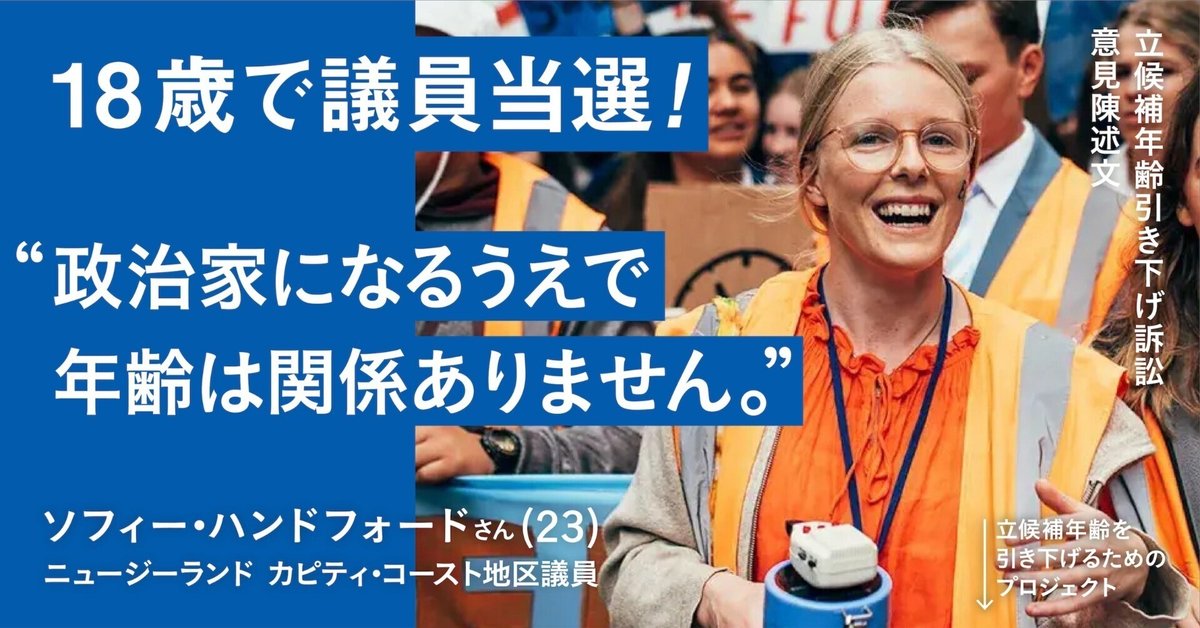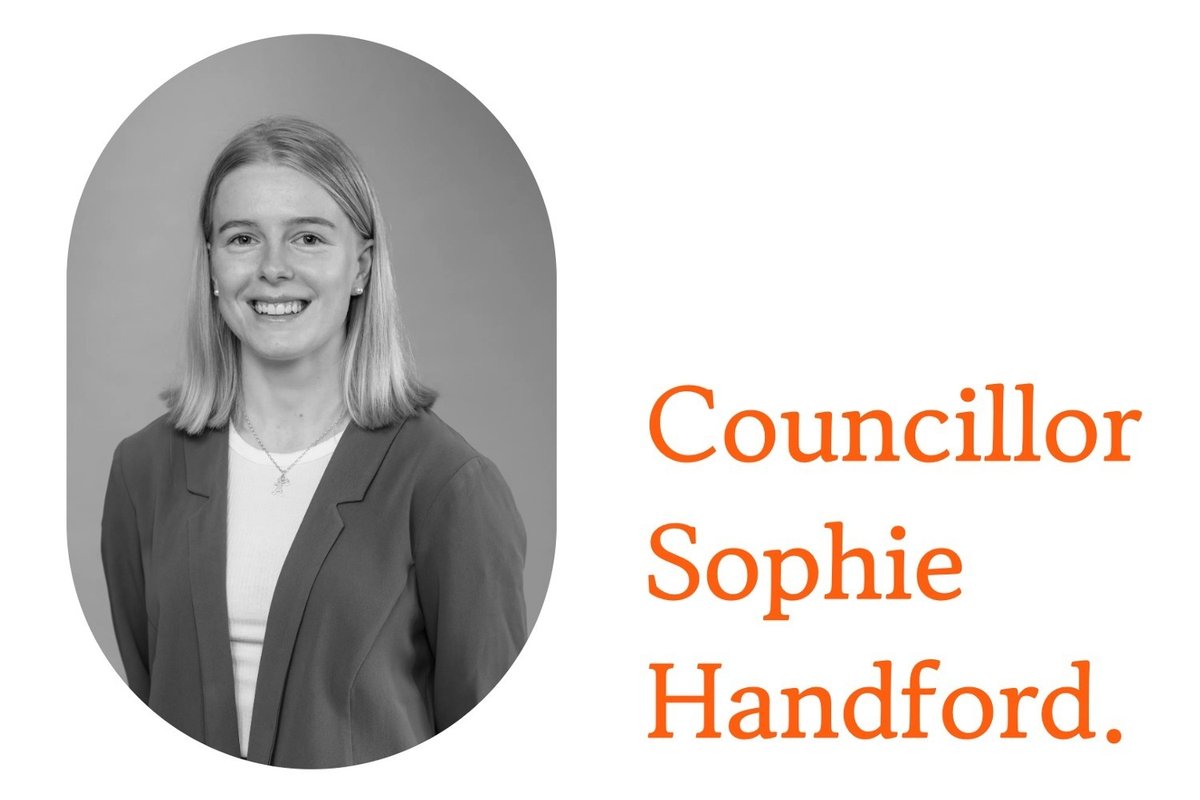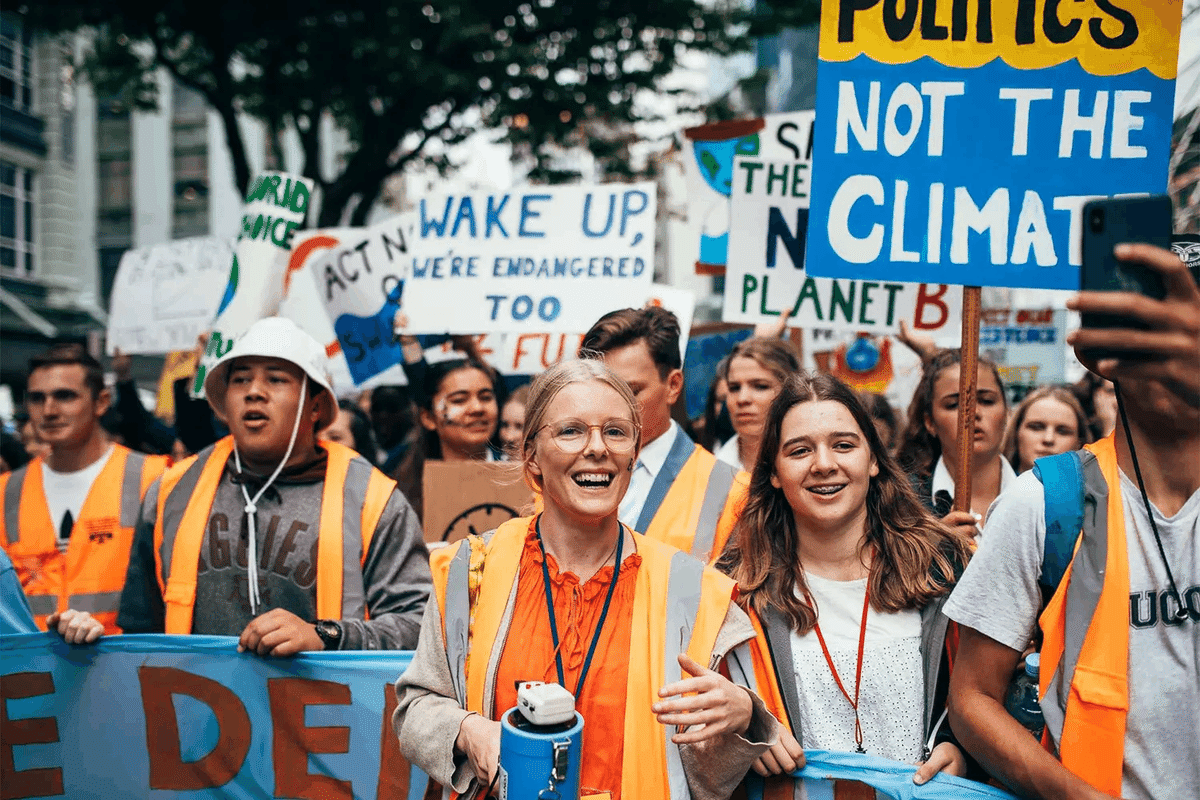
「政治家になるうえで年齢は関係ありません。」18歳で議員当選!ソフィー・ハンドフォードさん(23)陳述全文
2023年7月、10代・20代の原告6人が、若い世代の声が届く社会に向けて「立候補年齢引き下げ訴訟」を提訴しました。
そして第5回口頭弁論期日では、原告側が証拠として、18歳でニュージーランドの地区議員に当選したソフィー・ハンドフォードさんの意見陳述書を提出しました。23歳の現在も議員として活躍中のソフィーさんが日本の裁判所に届けてくれたメッセージ、ぜひご一読ください!(日本語/英語)
私はソフィー・ハンドフォード(Sophie Handford)、23歳です。ニュージーランドのカピティ・コースト(Capiti Coast)という自治体で現在2期目となる議員をしています。
私はニュージーランドの人口約1700人の小さな海辺の村で生まれ育ちました。父は林業を学び、生態学や環境学にも精通しています。先住民コミュニティなどと協力しながら環境問題や持続可能なコミュニティ作りに取り組んできました。私は生まれた時から毎日木を植えたり海で泳いだりして過ごしてきました。昨年も年間約170日海で泳ぎました。水、そして海は私の情熱の源でもあります。私の生まれ育った町は、一方に海があり、もう一方にクイーン・エリザベス・パークという広大な公園があります。町には海があり、山々や丘陵地帯、鉄道が通っています。非常に緑豊かなコミュニティであり、それを誇りに思っています。
私が初めて政治に興味を持ったのは12歳の時でした。ある日、カピティ・コーストの議会から手紙が届き、そこには気候変動が私たちの暮らしに与える影響が書かれていました。その手紙の内容は非常に衝撃的で、これをきっかけに私は気候変動を止めるために何ができるかを考え始めました。同じ年、地元の国会議員が小学校に講演に来た際、「地球を守り、若者が健やかに成長するためにどのような取り組みをしていますか?例えば気候変動には関心がありますか?」と尋ねたところ、その議員から「気候変動担当者に聞いてください」とあしらうような対応をされたことがありました。国会議員よりも一市民である私の方が気候変動問題に責任を感じるのは間違っているとその時思いました。この時の経験が、その後様々な社会問題に取り組み、政治家として立候補する原動力となりました。
高校・大学では、様々なエコアクショングループに参加しました。週末にはビーチの清掃活動を行い、プラスチックによる環境被害を訴えるキャンペーンを行いました。また、国連の「Girl Up」キャンペーンにも参加し、発展途上国の女性が教育や生理用品にアクセスできるよう支援しました。「40 Hour Challenge」という募金活動で集めた1万ドルを南スーダンの難民に送ったこともありました。高校では生徒代表になり、性別に基づく制服の着用を義務付けていた校則を変えるために奔走し、その結果、学校で男子はスカートを、女子はズボンを履くことができるようになりました。これらの経験は、小さいけれども私にとって大きな成功体験となりました。
2019年、18歳の時、私は「School Strike 4 Climate」という気候変動危機を訴えるムーブメントを起こし、ニュージーランド史上最大の単日ストライキを組織しました。このムーブメントには8歳から21歳までの若者約4万人が参加しました。290の企業から賛同を取り付け、それらの企業は労働者に終日休業を認めストライキに参加させました。私は「将来の世代のために、気候変動対策を無視することはできない」というシンプルなメッセージを発信し続けました。私たちは、ソーシャルメディアを活用し、様々な報道機関と良好な関係を築きながら、気候変動対策がどのようにしてより良いニュージーランドを作り、未来を築くかを語りました。そうしたところ、最終的にニュージーランド全人口の約3.5%の人びとがこのムーブメントに加わる結果となりました。ストライキ決行前には首相から「あなたと話がしたい」と連絡がありました。政治家たちも、私たちの動きを無視できないと感じたのです。この運動の結果、ゼロカーボン法が可決され、さらに気候非常事態宣言が出され、産業革命前のレベルから1.5度以内に温暖化を収める目標が設定されました。若者の主導によりニュージーランドの気候政策は大きく前進しました。
その後、私は18歳でカピティ―・コースト地区議会議員に立候補しました。候補者の中に、自分たち若者の価値観を理解し代弁してくれる人が誰もいないと感じたからです。40歳や50歳の男性が私たち若い世代の考えを政治に反映してくれるとは思えませんでした。立候補に対する社会からの反応は様々でした。私は多くの家を訪問しました。対話を重視するアプローチを意識し「あなたが気にかけていることは何ですか?あなたにとって重要なことは何ですか?」と尋ね続けました。こうしたアプローチはとても新鮮だったようで、多くの年配者が私を応援してくれました。その一方で、「人生経験が足りない」「大学を卒業していない」「世間知らずだ」といった否定的な意見も少なくありませんでした。しかし、最終的に私は反対派を上回る票を獲得し当選しました。若者には若者なりの経験があり、若者が意思決定に関わることで生まれるポジティブな結果を伝えることに成功したからだと考えています。例えば、私たちはソーシャルメディアを使ってムーブメントを起こし、人々を結びつける方法を知っています。これはほんの一例ですが、私たちの人生経験も上の世代のそれと同じように評価されてしかるべきです。人生経験は必ずしも年齢に依存するものではないのです。
選挙に当選した後、私は地区議会の戦略・財務委員会の委員長になりました。会議の議題を設定し、議論を促し、さまざまなレベルの意思決定に関与しています。特に、気候変動や青少年の育成には精力的に取り組んできました。そして、気候変動に関する行動計画の策定や青年評議会との関係構築など具体的な成果を上げてきました。自治体の知名度が国内外で高まり、自治体が担う太陽光プロジェクトと太陽光事業者のマッチングにも成功しました。カピティ・コースト地区の若者の政治参加も活発になりました。当初12人ほどだった自治体の青年評議会構成員は現在は25人となり、募集を上回る応募が来るようになりました。地域の若者から「あなたのキャンペーンチームに参加したい」、「もし次回の選挙で立候補しないなら私が立候補したい」といったメッセージも届くようにもなりました。
就任当初、私はその責任の重さに押しつぶされそうでした。市長に呼び出され「ソフィー、提案があるんだ。この委員会の委員長になってほしい」と言われたことを今でもよく覚えています。私はそれを為し遂げることができるかとても不安でした。携帯電話の中には支援者たちからのメッセージを保存していて、自信がなくなったときはそれを見て自分を奮い立たせていました。周囲のサポートもあり、徐々に自信をつけていくことができました。
大事なことなので繰り返しますが、政治家になるうえで、年齢は大きな問題ではないと思います。これまでの活動を通じて知り合った若者たちは誰よりも学ぶことに対してオープンで前向きでした。多くの人々の声に耳を傾け、オープンな姿勢で学び続けること。これさえできれば、どれだけ大きな役割が与えられたとしても、必ず成功すると確信しています。本当に年齢は関係ありません。やってみればすべて乗り越えることができます。それが私の経験です。
最後に、日本の裁判所へのメッセージを申し上げます。ニュージーランドでは、若者が政治に参加し、リーダーシップを発揮することで、多くのポジティブな変化が社会にもたらされました。日本でも、若者の声を尊重し、彼らが意思決定に参加できるような環境を整えることが重要です。私が裁判所にお伝えしたいのは、25歳未満の人々に押し付けられている現在の「差別」に耳を傾けなければ、同じような異議申し立てを、国内外から、今後も受け続けることになるということです。ニュージーランドで投票年齢を引き下げるMake It 16キャンペーンを主導した若者たちは粘り強く声を上げ続けてきましたし、日本で今声を上げている若者たちも全く同じだろうと感じています。彼らの背後には多くの仲間たちがいます。ニュージーランドは若者の政治参加においては世界の最前線にあります。最年少の国会議員は21歳で当選しました。23歳の市長もいます。彼らは驚異的な仕事をしています。25歳以下の候補者や選出議員がたくさんいますが、全員が素晴らしい仕事をして尊敬を集めています。日本でも若者の声が政治に反映される環境が整うことを強く願っています。若者たちが積極的に政治に参加し、未来を共に創り上げていくことが、持続可能で公平な社会を築くために不可欠だと思います。
以上が私からお伝えしたいメッセージです。裁判所の判断に期待します。

My name is Sophie Handford, and I am 23 years old. I am currently serving my second term as a councilor in the Kapiti Coast municipality in New Zealand.
I was born and raised in a small seaside village in New Zealand with a population of about 1,700 people. My father studied forestry and is also well-versed in ecology and environmental studies. He has been working on environmental issues and building sustainable communities in collaboration with indigenous communities and others. Since I was born, I have spent my days planting trees and swimming in the sea. Last year, I swam in the sea for about 170 days in total. Water, especially the sea, is a source of passion for me. The town where I grew up has the sea on one side and a vast park called Queen Elizabeth Park on the other. The town features the ocean, mountains, hills, and a railway running through it. It’s a very lush, green community, and I am proud of it.
I first became interested in politics when I was 12 years old. One day, a letter arrived from the Kapiti Coast council, detailing how global warming and rising sea levels might impact our community in the coastal town. The content of that letter was shocking, and it prompted me to start thinking about what I could do to stop climate change. That same year, when a local Member of Parliament came to give a talk at my elementary school, I asked, “What are the activities you do to protect the Earth and ensure that young people can grow up healthy? For example, are you concerned about climate change?” The MP responded dismissively, telling me to “ask the person in charge of climate change.” I felt it was wrong that I, as an ordinary citizen, felt more responsible for addressing climate change than an MP. This experience became the driving force behind my later efforts to tackle various social issues and eventually run for office as a politician.
In high school and university, I participated in various eco-action groups. On weekends, I took part in beach clean-up activities and ran campaigns to raise awareness about the environmental damage caused by plastic. I also participated in the UN's 'Girl Up' campaign, supporting women in developing countries to access education and menstrual products. Through a fundraising activity called the '40 Hour Challenge,' I raised $10,000, which was sent to refugees in South Sudan. In high school, I became the student representative and worked to change the school rules that mandated gender-specific uniforms. As a result, boys were allowed to wear skirts, and girls could wear pants at school. These experiences, though small, were significant personal successes for me.
In 2019, at the age of 18, I initiated a movement called ‘School Strike 4 Climate’ to address the climate crisis, organizing the largest single-day strike in New Zealand's history. Around 40,000 young people aged 8 to 21 participated in this movement. We secured support from 290 companies, which allowed their workers to take the day off to join the strike. I consistently delivered a simple message: “We cannot ignore climate action for the sake of future generations.” We leveraged social media and built strong relationships with various media outlets to communicate how climate action can create a better New Zealand and shape the future. As a result, approximately 3.5% of New Zealand's entire population joined this movement. Before the strike, the Prime Minister contacted me, saying, “I want to talk to you.” Politicians realized they could no longer ignore our movement. As a result of this campaign, the Zero Carbon Act was passed, a climate emergency was declared, and a goal was set to limit global warming to within 1.5 degrees above pre-industrial levels. Led by young people, New Zealand's climate policy made significant progress.
After that, at the age of 18, I ran for councilor in the Kapiti Coast District Council. I felt that none of the candidates understood or represented the values of us young people. I couldn’t believe that men in their 40s or 50s could truly reflect our generation’s thinking in politics. The response from society to my candidacy was mixed. I visited many homes, focusing on a dialogue-driven approach, continuously asking, “What do you care about? What is important to you?” This approach seemed very refreshing, and many older people supported me. However, there were also quite a few negative opinions, such as “You lack life experience,” “You haven’t graduated from university,” and “You’re naive.” Despite this, I ultimately won more votes than the opposition and was elected. I believe this success was because I effectively conveyed that young people have their own experiences and that involving them in decision-making can lead to positive outcomes. For example, we know how to use social media to start movements and connect people. This is just one example, but our life experiences should be valued just as much as those of the older generation. Life experience doesn’t necessarily depend on age.
After winning the election, I became the chair of the Strategy and Finance Committee of the District Council. In this role, I set the agenda for meetings, encouraged discussions, and participated in decision-making at various levels. I have been particularly dedicated to addressing climate change and youth development. My efforts have led to tangible outcomes, such as the creation of an action plan for climate change and the establishment of strong relationships with the Youth Council. The municipality's recognition has increased both domestically and internationally, and we successfully matched the municipality’s solar projects with solar energy providers. Youth political participation in the Kapiti Coast District has also become more active. The Youth Council, which initially had around 12 members, now has 25, with more applicants than available spots. I also receive messages from local young people saying, “I want to join your campaign team,” or “If you don’t run in the next election, I want to run.”
At the beginning of my term, I felt overwhelmed by the weight of the responsibility. I still vividly remember when the mayor called me and said, “Sophie, I have a proposal for you. I want you to become the chair of this committee.” I was very anxious about whether I could fulfill the role. I kept messages from supporters on my phone, and whenever I lost confidence, I would look at them to motivate myself. With the support of those around me, I gradually gained confidence.
I’ll repeat this because it’s important: I don’t believe age is a significant issue when it comes to becoming a politician. The young people I’ve met through my activities have been more open and eager to learn than anyone else. As long as you can listen to many voices and maintain an open attitude toward learning, I am confident that you will succeed no matter how large the role you’re given. Age truly doesn’t matter. If you try, you can overcome anything. That’s been my experience.
Finally, I would like to deliver a message to the Japanese court. In New Zealand, young people’s participation in politics and their leadership have brought about many positive changes in society. It is important in Japan as well to respect the voices of young people and create an environment where they can participate in decision-making. What I want to convey to the court is that if the current ‘discrimination’ against people under 25 is not addressed, similar objections will continue to arise, both domestically and internationally. The young people who led the ‘Make It 16’ campaign to lower the voting age in New Zealand persistently raised their voices, and I believe that the young people speaking up in Japan now are exactly the same. They have many peers supporting them. New Zealand is at the forefront of youth political participation globally. Our youngest Member of Parliament was elected at 21, and we have a mayor who was elected at 23. They are doing incredible work. There are many candidates and elected officials under 25, all of whom are doing remarkable work and earning respect. I strongly hope that Japan will also create an environment where the voices of young people are reflected in politics. I believe that young people actively participating in politics and helping to shape the future together is essential for building a sustainable and fair society.
The above is the message I wanted to convey. I look forward to the court’s decision.

「立候補年齢引き下げ訴訟」サポーターになりませんか!
教育・雇用・福祉・メンタルヘルス・環境問題・気候変動・軍縮・ジェンダー・LGBTQ・多様性。長期的な視点を持った10代・20代の声が届く政治は、日本をもっと持続可能で、生きやすい社会にします。
「立候補年齢引き下げ訴訟」について、詳しく知りたい方や応援くださる方はぜひ下記リンクページへ。クラウドファンディングも実施中です。みなさまの応援をお待ちしています。
